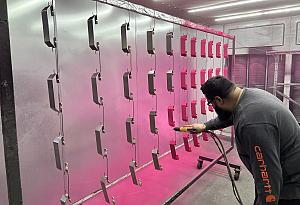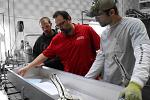- FMA
- The Fabricator
- FABTECH
- Canadian Metalworking
Categories
- Additive Manufacturing
- Aluminum Welding
- Arc Welding
- Assembly and Joining
- Automation and Robotics
- Bending and Forming
- Consumables
- Cutting and Weld Prep
- Electric Vehicles
- En Español
- Finishing
- Hydroforming
- Laser Cutting
- Laser Welding
- Machining
- Manufacturing Software
- Materials Handling
- Metals/Materials
- Oxyfuel Cutting
- Plasma Cutting
- Power Tools
- Punching and Other Holemaking
- Roll Forming
- Safety
- Sawing
- Shearing
- Shop Management
- Testing and Measuring
- Tube and Pipe Fabrication
- Tube and Pipe Production
- Waterjet Cutting
Industry Directory
Webcasts
Podcasts
FAB 40
Advertise
Subscribe
Account Login
Search
'Work like hell to win now'
- By Vicki Bell
- May 27, 2009
If you read last week's blog post "Leapfrogging the competition," you know about the Barclay's Commercial survey cited in the May issue of "Tube Talk" that said 54 percent of UK businesses view the ability to leapfrog struggling competitors as their key opportunity in the current recession. You also know that 31percent view staff loyalty, retention, and productivity as their greatest opportunity during the economic downturn.
That post included remarks from a "Tube Talk" reader who agreed wholeheartedly with the findings, particularly about the opportunity to retain skilled workers. This reader shared his frustration with the trend to cut the work force to trim costs. He said, "We need to start looking for creative ways to cut back so as to keep our most valuable asset, our work force."
Another reader believes the work force-related opportunities that exist in a recession go beyond retaining your skilled workers—it's time to weed out poor performers and find the talent that can take you to the next level.
Gary Fruchtman, president of The Kent Group Inc., wrote, "I was particularly interested in the remarks by David Marks of Barclay's Commercial Bank. He made a great point when he rightfully pointed out that the primary focus of over 50 percent of corporate attention is upon the 'challenges faced by competitors as their key recessionary opportunity.' He went on to say that, 'These results show that far from concentrating solely on survival, many companies are using this period to make a renewed push for growth and market share.'
"The issue for many companies today is that they get so caught up in market negativity that they lose the fact that there are tremendous opportunities as well! The true leaders in our industry will use this time to solidify their positions and fight like hell to win now. Winning now is securing immediate increase in market share and immediate bear market profitability—today.
"During a bull market, a company's objective must be to maximize margin, volume, and profit. During a bear market, the objective must not be survival; it is our obligation to win. To win in a bear market is to gain market share—to win new customers, so that as the economy recovers, the improved market share brings leveraged volume and profits.
"Companies with strategic vision understand this and work hard to position themselves for that return. They must not only reduce their work force, but they must see this as an opportunity to do so! An opportunity like this to cut poor performers, trim negative attitudes, and [weed out] those who are no longer a fit for the win today company culture will not be found again for a long time.
"By the same token, companies cannot be timid—even in the face of trimming their work force—to add talent that will achieve their strategic vision. There are two prime reasons to hire talent: Hires to generate revenue and increase market share, and hires to save money through better operations, engineering, maintenance, or financial control. Great managers must be hell-bent on finding those impact individuals and in finding them before their competitors do, or risk being put at a competitive disadvantage—right now. These are bad times for the timid and great times for those bold enough to seize the opportunities that are available now."
If you clicked on the link to the The Kent Group Web site, you know that the company is a staffing services consulting firm, which means that Fruchtman has a rather self-servicing interest in encouraging employers to make the most of this opportunity to improve their work forces with new hires. Nevertheless, he made some really good points. Poor performers at all levels can have a very bad impact on business. This is particularly noticeable in a tough business climate, as noted in the article "The recession and weeding out America's worst management" on 24/7 Wall St.
Poor performance can encompass many aspects, including negativity. Surrounded by predominately negative headlines and events, it can be difficult to remain positive. But a positive attitude based in reality can be critical for survival and growth. Don't let a cloud of negativity permeate your workplace and drag it down. For more about negativity and its effects in the workplace, read thefabricator.com series, "Shedding light on negativity," Part I and Part II. Marty Rice's article "We're all in this together" discusses negativity and how important it is to support each other in the workplace, particularly now. It's a must-read, especially for welders and Rice fans.
Be smart, positive, productive; run the best possible ship; and kick butt.
subscribe now

The Fabricator is North America's leading magazine for the metal forming and fabricating industry. The magazine delivers the news, technical articles, and case histories that enable fabricators to do their jobs more efficiently. The Fabricator has served the industry since 1970.
start your free subscriptionAbout the Author

Vicki Bell
2135 Point Blvd
Elgin, IL 60123
815-227-8209
- Stay connected from anywhere

Easily access valuable industry resources now with full access to the digital edition of The Fabricator.

Easily access valuable industry resources now with full access to the digital edition of The Welder.

Easily access valuable industry resources now with full access to the digital edition of The Tube and Pipe Journal.
- Podcasting
- Podcast:
- The Fabricator Podcast
- Published:
- 04/16/2024
- Running Time:
- 63:29
In this episode of The Fabricator Podcast, Caleb Chamberlain, co-founder and CEO of OSH Cut, discusses his company’s...
- Industry Events
16th Annual Safety Conference
- April 30 - May 1, 2024
- Elgin,
Pipe and Tube Conference
- May 21 - 22, 2024
- Omaha, NE
World-Class Roll Forming Workshop
- June 5 - 6, 2024
- Louisville, KY
Advanced Laser Application Workshop
- June 25 - 27, 2024
- Novi, MI































